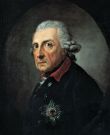Translation by Christoph Werner (Weimar, Thuringia) and Michael Leonard (Petaluma, California)
What did the future have in store for a new-born child in the year of 1712 in Berlin? This was a period of the Little Ice Age, which extended from about 1675 to 1715, and everybody, whether well-to-do or poor, was born into a particularly cold part of it. There were long, cold winters, raw and clammy summers, small crop yields, rising prices and wide-spread famine. Epidemics tormented the people; in Prussia alone, in 1710, the so-called pest year, the plague carried off 102,000 people from an estimated population of 2 million inhabitants. The poor died more quickly than their happier contemporaries whose parents could provide them with a warm dwelling, sufficient food and, if necessary, the services of a doctor. But even doctors were sometimes of doubtful benefit, as the art of healing mainly consisted of the draining of evil body juices by means of bleeding or bloodletting, which in many cases accelerated the exitus letalis of the patient’s weakened body.
The boy, however, who on the 24th of January 1712 saw the light of day in the Royal Palace (Berliner Schloss), had a good chance of surviving childhood. And he was also lucky. Two elder brothers had died shortly after their birth, one of them, so rumour had it, because his grandfather (Prince-elector of Brandenburg Frederick III, as the first „King in Prussia“ Frederick I) was so elated by the birth of his grandchild that he ordered cannons be fired in front of the birthing room, and the noise was so deafening that the infant was struck by “an evil“ and soon died. The other boy passed away, it was said, because the golden crown pressed on his head during baptism was too heavy.
Frederick, the third son of Crown Prince Frederick William and his wife Sophia Dorothea of Hanover, survived all manifestations of grandfatherly joy and even the ordeal of baptism. His godfathers were, among others, Emperor Charles VI, Czar Peter the Great, the States General of the Netherlands as well as the Crown Prince of Hanover, later King George II of Great Britain, who was his mother's brother.
The external conditions of life for the little crown prince were excellent, but he was to endure a difficult and painful childhood due to a strict, pious, irascible and brutal father, the later King Frederick William I, also called the Soldier King. But to be fair, those years were also painful for the father, who had to observe with heartaches and rage how the Crown Prince seemed to grow up in a way diametrically opposed to his wishes. He feared that his tremendous work of reconstruction and reform in Prussia would be put at risk by a careless successor, who in addition did not seem to relish hard work. The Soldier King was simple-minded and believed in the educational effect of humiliation and the beating of his son (in front of the royal court) in an attempt to crush his interest in music, Latin, and the reading of literary works.
He was unsuccessful in this but in the effort managed to deform the Prince’s character in such a way that for the rest of his life his contemporaries felt he was a cynic and a despiser of mankind.
Frederick William at the end of his life finally began to trust his son's suitability as an efficient ruler, and indeed, had he seen the kind of country his son left behind when he died in 1786 he would have been greatly pleased because Prussia had grown in land and people and become a major European power.
*****
Source of Picture: Christian Daniel Rauch: Equestrian Statue of Frederick the Great (Unter den Linden, Berlin), Photo by Manfred Brückels, 2005. wikipedia






